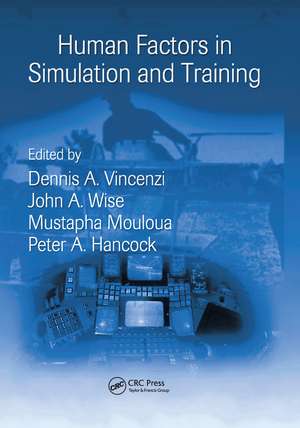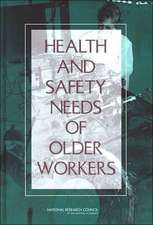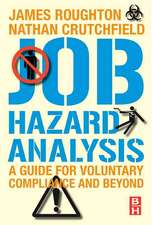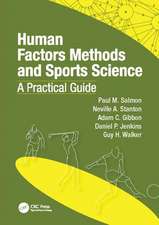Human Factors in Simulation and Training
Editat de Peter A. Hancock, Dennis A. Vincenzi, John A. Wise, Mustapha Moulouaen Limba Engleză Paperback – 29 iul 2019
The editors have collected chapters on a wide variety of topics, beginning with theory and application in areas ranging from traditional training to augmented reality to virtual reality. This coverage includes surface ships, submarines, naval aviation, commercial aviation, space, and medicine. The theory based section focuses on human factors aspects of simulation and training ranging from the history of simulators and training devices, to future trends in simulation from both a civilian and military perspective. The chapters expand on concepts regarding simulator usage particularly with respect to the validity and functionality of simulators as training devices. They contain in depth discussions of specific issues including fidelity, interfaces and control devices, transfer of training, simulator sickness, effects of motion in simulated systems, and virtual reality.
As more, and more sophisticated, simulation tools and training technologies become available, a complete understanding of how to use them appropriately will be even more crucial. Elucidating theory and application, the book addresses numerous issues and concepts pertaining to human factors in simulation and training, making this volume an important addition to the bookshelf of any human factors professional.
| Toate formatele și edițiile | Preț | Express |
|---|---|---|
| Paperback (1) | 416.83 lei 43-57 zile | |
| CRC Press – 29 iul 2019 | 416.83 lei 43-57 zile | |
| Hardback (1) | 1121.98 lei 43-57 zile | |
| CRC Press – 17 dec 2008 | 1121.98 lei 43-57 zile |
Preț: 416.83 lei
Preț vechi: 521.04 lei
-20% Nou
Puncte Express: 625
Preț estimativ în valută:
79.76€ • 83.49$ • 66.39£
79.76€ • 83.49$ • 66.39£
Carte tipărită la comandă
Livrare economică 31 martie-14 aprilie
Preluare comenzi: 021 569.72.76
Specificații
ISBN-13: 9780367376451
ISBN-10: 0367376458
Pagini: 468
Ilustrații: 10 equations; 27 Tables, black and white; 89 Illustrations, black and white
Dimensiuni: 178 x 254 x 25 mm
Greutate: 0.86 kg
Ediția:1
Editura: CRC Press
Colecția CRC Press
ISBN-10: 0367376458
Pagini: 468
Ilustrații: 10 equations; 27 Tables, black and white; 89 Illustrations, black and white
Dimensiuni: 178 x 254 x 25 mm
Greutate: 0.86 kg
Ediția:1
Editura: CRC Press
Colecția CRC Press
Public țintă
Academic, Professional, and Professional Practice & DevelopmentCuprins
Human Factors in Simulation and Training: An Overview. Justification for Use of Simulation. Transfer of Training. Simulation Fidelity. Controls and Displays for Aviation Research Simulation. Simulation Sickness. Situation Awareness in Simulation and Training. Human Factors and Discrete Event Simulation. Virtual Reality in the Training Environment. Ship-handling Applications for Virtual Environment Simulation. The Transformation of Ship Handling and Navigation Training. Space Adaptation Syndrome and Perceptual Training. Civil Aviation: Flight Simulators and Training. Augmented Reality as a Means of Job Task Training in Aviation. Simulation Research in the Command and Control of Air Operations: Implications of the Network-Centric Concept. Simulation Advances in Medical Education and Training: Laparoscopic Skill Acquisition. Performance measurement Issues and Guidelines for Adaptive, Simulation-Based Training. Performance Assessment in Simulation. The Future of Simulation.
Notă biografică
Peter A. Hancock, Dennis A. Vincenzi, John A. Wise, Mustapha Mouloua
Descriere
The book provides advanced understanding of training techniques and methods and discusses methods of fidelity, interfaces and control devices, transfer of training, simulator sickness, and effects of motion on simulator systems. It also incorporates theories pertaining to the motivational aspects of training.











